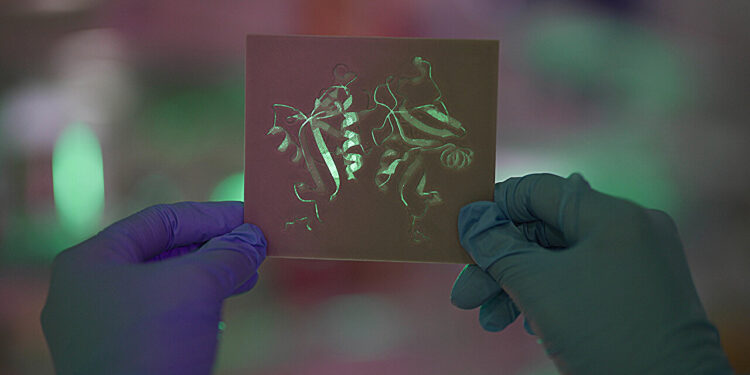A 3D printed stencil of the structure of the DECTIN-1 protein. Credit: Tracey Nearmy/ANU
An immune system protein programmed to protect the body against fungal infections is also responsible for exacerbating the severity of certain autoimmune diseases such as irritable bowel disease (IBS), type 1 diabetes, eczema and other chronic conditions, according to a new study from the Australian National. The University (ANU) has found.
This discovery could pave the way for new, more effective drugs without the unpleasant side effects of existing treatments. In addition to helping manage serious autoimmune diseases, this advance could also help treat all types of cancer. The work was published in Scientists progress.
Scientists have discovered a previously unknown function of the protein, known as DECTIN-1, which, in its mutated state, limits the production of regulatory T cells, or so-called “guardian” cells, in the immune system.
These guardian cells are essential for preventing autoimmune diseases because they suppress the effects of an overactive immune system, which can be extremely dangerous if not properly regulated.
The immune system is designed to protect the body against infections, but in severe cases it becomes overactivated and turns the body’s natural defenses against itself.
“When this happens, the immune system falsely perceives healthy cells as a threat, causing it to attack the body and promote the onset of autoimmune diseases,” said lead author Dr. Cynthia Turnbull, ANU.
“Although the DECTIN-1 protein helps fight fungal infections, in its mutated state it is also responsible for exacerbating serious autoimmune diseases.”
“Understanding how and why the mutated version of this protein causes autoimmunity in patients takes us closer to developing more effective drugs and offers new hope to more than a million Australians who suffer from some form of the disease autoimmune.”
Scientists believe they can control the immune system by turning the DECTIN-1 protein on and off, like a light switch.
“Activation of the protein would reduce the intensity of the immune system’s defensive response, which would help treat conditions such as autoimmune diseases,” said Professor Carola Vinuesa, of the Francis Crick Institute.
“On the other hand, turning off the protein could give the immune system a boost, sending its defense mechanisms into overdrive and allowing the body to treat an entirely different set of diseases.”
“The results are exciting because there haven’t been many discoveries of so-called modifier proteins such as DECTIN-1, which can change the way the immune system behaves to the extent that it can either cause disease or prevent.”
According to Dr. Turnbull, this means that DECTIN-1 could play a key role in cancer treatment.
“Cancer cells can disguise themselves by releasing certain proteins and chemicals into the body, making them invisible to the immune system’s natural defenses,” she said.
“We believe that by using drugs to deactivate the DECTIN-1 protein, in combination with existing therapies, we can activate the immune system and help it identify and attack cancer cells.”
Current treatments for autoimmune diseases are not very effective and have many harmful side effects. Indeed, the majority of existing treatments suppress the entire immune system rather than targeting a specific area.
“This means it might not address the exact problem causing the patient’s illness and could inadvertently leave them vulnerable to infections. Many people on this type of treatment also get bacterial, fungal, and viral infections which can worsen their autoimmunity,” said Professor Vinuesa.
By examining the DNA of a Spanish family, researchers discovered that the DECTIN-1 mutation was responsible for exacerbating the severity of a chronic autoimmune disease suffered by the family’s only child.
“We discovered that the family also carried a mutated version of another immune system protein known as CTLA-4. The CTLA-4 mutation prevents guardian cells from functioning properly and is known to cause serious autoimmune diseases in about 60-70% of people who carry it in their DNA,” said Dr Pablo Canete, from the University of Queensland. “Strangely, the remaining 30 to 40 percent of the population who carry this mutated protein do not develop disease.”
“We discovered that the only child in the family had both the DECTIN-1 mutation and the CTLA4 mutation, while his parents only had one of each. This helped us identify why the child, who is now in her 20s, was the only person in the family to develop severe autoimmunity, ending a 20-year mystery about the cause of her illness.
“By discovering the existence of mutated versions of modifier proteins such as DECTIN-1, we finally have an explanation for why some people develop serious autoimmune diseases while others do not, even if they inherit mutations genetics transmitted by members of their family.
The research was led by the ANU in collaboration with the University of Queensland and the Francis Crick Institute.
More information:
Cynthia Turnbull et al, DECTIN-1: a modifying protein in CTLA-4 haploinsufficiency, Scientists progress (2023). DOI: 10.1126/sciadv.adi9566. www.science.org/doi/10.1126/sciadv.adi9566
Provided by Australian National University
Quote: Fungus-fighting protein could help beat serious autoimmune diseases and cancer (December 6, 2023) retrieved December 6, 2023 from
This document is subject to copyright. Apart from fair use for private study or research purposes, no part may be reproduced without written permission. The content is provided for information only.



